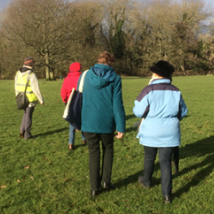ARC East of England researchers collaborated with Hertfordshire health and care system partners to understand how to help people living with dementia and their carers access physical activities in dementia friendly communities.
Dementia is a global challenge and public health priority, and physical activity can improve the wellbeing of people affected and their carers. It can also help people living with dementia to feel connected with their local community. Although physical inactivity has been shown to be a risk factor for dementia, there is limited research on how physical activity programmes impact the experiences of people living with dementia.
This ARC East of England research project used a mixed-methods approach to understand the experiences, benefits, and challenges of physical activity provision for adults living with dementia in Dementia Friendly Communities (DFCs). An online survey about physical activities available within communities and resources for delivery was completed by 31 DFC leads, and interviews and focus groups were run across three case study sites with50 providers and commissioners of physical activity, and 15 people affected by dementia with 11 family supporters.
It built on a previous study, the National Evaluation of Dementia Friendly Communities (DEMCOM) led by Professor Claire Goodman, and was co-led by our inclusive involvement theme co-lead Dr Elspeth Mathie with Professor Elizabeth Pike at the University of Hertfordshire, working with Hertfordshire County Council, Stevenage Borough Council, The Red Shed in Stevenage and Alzheimer’s Society. Members of public involvement groups and experts with lived experience shaped how the questions were framed, data collection approaches and the definitions of physical activity used.
“Working with people living with dementia is crucial to ensure research is tackling the right priorities, that research is accessible and having meaningful impact. Thank you to everyone who took part in this study to share their experiences."
Dr Elspeth Mathie, Inclusive Involvement Theme Co-Lead
Elspeth said: "We found that DFCs offered a range of adapted dementia inclusive and specific activities, but people were not routinely provided information on them at the time of diagnosis. Working with local councils is key to improve access to information and infrastructure change to support sustainable inclusion within their local community.”
The research team have now published their findings in the international Journal of Aging and Physical Activity, available to read online:
- Read the full paper on Physical Activity Inclusion in Dementia-Friendly Communities: A Mixed Methods Study
- Download the poster summarising key findings
Acting on these findings and with further funding, the team worked with people living with dementia, family supporters and physical activity providers to map physical activities available in Stevenage and co-produce an information brochure with Stevenage Borough Council and Stevenage Dementia Involvement Group. Over 500 hundred paper copies have been distributed via healthcare providers, the council, local dementia groups and sports clubs.
Lorna Wormald, Leisure and Health Development Officer for Communities and Neighbourhoods at Stevenage Borough Council said: "Collaborating with Elspeth and her team at the University of Hertfordshire and the ARC East of England has been an inspiring journey in advancing Dementia Friendly Communities. Our joint efforts resulted in the creation of a transformative physical activity brochure tailored for individuals living with dementia in Stevenage. This invaluable resource has proven to be a beacon of support and empowerment for many within our community.
"Not only has it positively impacted the lives of individuals, but it also played a pivotal role in our successful application to be recognised as a Dementia Friendly Community by Alzheimer's Society.
This collaborative endeavour underscores the importance of research, community engagement, and partnership in fostering a more inclusive and supportive environment for those affected by dementia.”
Lorna Wormald, Leisure and Health Development Officer, Stevenage Borough Council
In 2023, the study team ran a series of three workshops to share their findings with attendees from physical and care-home activity providers, social prescribers, carers and nurses, gardening and social club providers, health and social care practitioners, people with lived experience, and Hertfordshire County Council. They produced a policy briefing with service providers of physical activities for people living with dementia in Hertfordshire, recommending that when diagnosed, people can be linked to local dementia inclusive physical activities and physical activity providers can access dementia training to successfully adapt their activities.
The study team continues to work with all partners in the Hertfordshire Mental Health Learning Disability and Autism Health and Care Partnership to translate ARC East of England research on dementia friendly communities into their new dementia strategy to improve inclusion and access to resources and support. They attend meetings to provide advice and guidance on research findings and evaluation.
Helen Maneuf, Operations Director for Older People’s Services and Co-Chair for the Dementia Co-Production Board at Hertfordshire County Council said:
“Ensuring that people with dementia can access healthy activities and continue taking part in social events and team sports is vital in keeping people connected to their local communities, maintaining their physical health, and helping to delay further deterioration of thinking and communication skills.
"Through working with our communities and the strategy workstreams, we know that people of all ages with dementia enjoy and benefit from starting or continuing physical activities and our shared priorities fully support this approach. We are looking forward to building on this research to help people live full and healthy lives now and in the future.”
Helen Maneuf, Co-Chair for the Dementia Co-Production Board at Hertfordshire County Council
This research was supported by the ESRC- UKRI Industrial Strategy Challenge Fund: Healthy Ageing Catalyst Awards 2020 [grant number ES/V009699/1], and by the National Institute for Health and Care Research (NIHR) Applied Research Collaboration East of England (NIHR ARC EoE) at Cambridgeshire and Peterborough NHS Foundation Trust.
